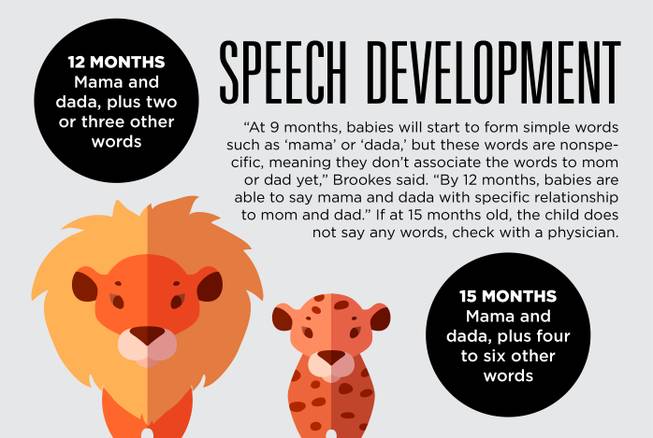
Sunday, June 28, 2015 | 2 a.m.
Children develop rapidly during the first four years of their lives and experience many major milestones along the way.
“During this time, children develop socially, linguistically, cognitively and physically,” said Lesa Brookes, MD, a pediatrician at Healthy Kids Pediatrics.
Because children undergo so many drastic changes, it’s important for parents to be diligent about regular check-ups, keeping vaccines up to date, and observing, playing and engaging with the child. Parents should be aware of the many important milestones that can ensure a child is developing properly.
1-2 months
Parents’ role
Parents and guardians play a huge role in childhood development. Brookes suggests several ways parents can aid in a child’s development, including talking to the child, explaining how things work and why, holding the child, reading to the child to help develop linguistic skills and listening to music together.
The baby can roll from his side to his back, can lift his chest up using his arms, and when held upright, can hold his head up. He coos and babbles at people he recognizes and is able to focus his eyes on his parents and objects. He is startled by sudden noises and is beginning to smile.
2-3 months
He can hold his head up for prolonged periods. He turns his head to hear sounds and can meet and follow an adult’s gaze.
4 months
He can roll from his stomach to his back and can rest on his elbows. He can laugh, make different sounds while verbalizing, and verbalizes to engage others. He can follow moving hands with his eyes, and his color-vision is close to fully formed. He expresses happiness appropriately and is beginning to reach for objects.
5 months
He can hold his head steady and pursue objects successfully. He begins to notice colors.
Speech development
“At 9 months, babies will start to form simple words such as ‘mama’ or ‘dada,’ but these words are nonspecific, meaning they don’t associate the words to mom or dad yet,” Brookes said. “By 12 months, babies are able to say mama and dada with specific relationship to mom and dad.” If at 15 months old, the child does not say any words, check with a physician.
18 months: Mama and dada, plus 10 to 20 other words
2 years: 50 words and starts to combine words to make two-word sentences
3 years: About 250 words and starts to combine words to make three-word sentences
6 months
He can move objects and toys between his hands and begins showing signs of hand-eye coordination. He can pull himself up to sit. He may begin to show stranger anxiety.
9-10 months
He can wiggle, crawl and sit unsupported. He looks for dropped toys and exhibits apprehension around strangers.
1 year
He can stand holding furniture and stand unassisted for a few seconds before falling. He can say two or three words repeatedly. When he drops toys, he looks to where they fell. He understands and complies with simple commands and waves goodbye.
18 months
He can walk alone, pick up toys without falling over and is beginning to hop with both feet. He babbles, often using intelligible words, and can recognize familiar songs. He may try to sing along or hum. He can drink from a cup using both hands and can feed himself with a spoon. By this age, potty training should be introduced.
Note: Children with autism usually are diagnosed at this age.
2 years
He can run, walk up and down stairs and is beginning to speak in two- to three-word sentences. He can speak clearly enough for strangers to understand at least half of what he is saying. His play is becoming more sophisticated; he engages with others and can build structures with blocks. By 2 1/2 years, he should be getting comfortable with potty training and working on maintaining daytime dryness.
3 years
He can speak in sentences and will ask questions constantly. He will play cooperatively and imaginatively.
4 years
He will be able to skip, hop on one foot, and dress and undress without assistance. His speech should be clear, and he should be potty trained completely but may still experience occasional nighttime wetness.

Join the Discussion:
Check this out for a full explanation of our conversion to the LiveFyre commenting system and instructions on how to sign up for an account.
Full comments policy